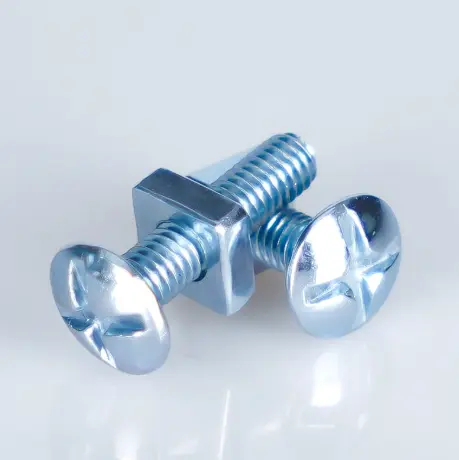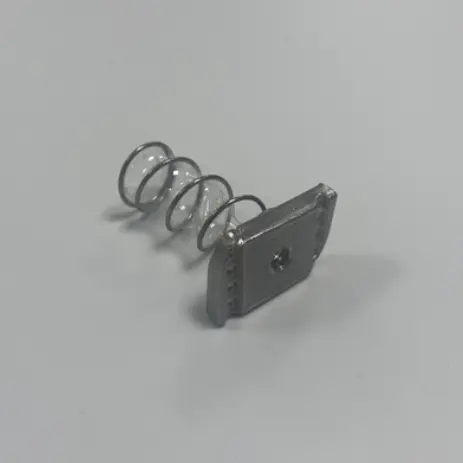caTEGORIES
Tags
Optimizing Joint Design with Accurate Through Bolt Capacity Evaluations

Posted: October 02, 2025
Categories: News
Tags: news
When you’re putting together a solid joint in any structure, getting the load-bearing capacity of through bolts right can make all the difference. It’s not just about picking a bolt and hoping for the best—it’s about knowing how much weight or stress it can handle in real-world setups. Qewit Fasteners Co., Ltd., which started back in 2004 as a British-owned outfit, knows this inside out. They’ve built a reputation for supplying top-notch fasteners and fixings to folks across Europe and beyond. Think of them as that reliable partner who sources from China and nearby spots like Taiwan or Thailand, but with a Western touch in how they handle quality and customer service.
In this post, we’ll dive into calculating through bolt capacities, tying in Qewit’s standout products like their Mushroom Head Roofing Bolts with Square Nuts and Spring Nuts. These aren’t just off-the-shelf items; they’re made with careful quality checks, from hardness testing to corrosion resistance.
Why Are Through Bolts Critical for Joint Stability
Through bolts go all the way through materials, clamping everything tight. They spread forces evenly, which is key in spots where things might shift or vibrate.
Enhanced Load Distribution
Qewit’s Mushroom Head Roofing Bolts shine here. With their wide, low-profile mushroom head, they spread out the tightening force over a bigger area. This works great on thin sheet metal or softer wood, cutting down on dents or cracks. Sizes run from M10 up to M260, all in carbon steel with a bright zinc plate to fight rust. Pair them with square nuts, and you’ve got even better grip without slipping.
High Tensile Strength
These bolts come in grade 4.8, tough enough for roofing or light industrial jobs. They’re fully threaded, so you get consistent hold along the length. In my experience, skipping the tensile check can lead to surprises—like that time a buddy’s shed roof gave way during a storm. Qewit tests every batch with tools like tensile strength testers, so you know they’re up to snuff.
Vibration Resistance
Nobody wants a joint coming loose over time. That’s where the square nuts come in handy—they lock in place and resist turning. For roofing, where wind rattles everything, this combo from Qewit keeps things steady. It’s simple, but effective, especially in outdoor setups.
How Do Material Properties Affect Bolt Capacity
Materials aren’t all the same. Steel bends one way, wood another. Figuring out how your bolt interacts with the base material avoids weak spots.
Material Hardness
Qewit runs Vickers and Rockwell tests on their bolts to hit the right hardness levels. For Mushroom Head Roofing Bolts, it’s carbon steel that holds up well without being brittle. Too soft, and it deforms; too hard, and it snaps. They offer options in stainless or brass too, if you need something custom.
Corrosion Resistance
Outdoors, rust is the enemy. That’s why Qewit’s bright zinc plated or hot-dipped galvanized finishes matter. Take their roofing bolts—they stand up to weather without losing strength. I’ve seen projects where cheap bolts corroded fast, turning a quick fix into a redo. Not with these.
Shear and Tensile Limits
Shear is side-to-side force; tensile is pull-apart. Qewit’s proof load testers check both. For through bolts in concrete or metal, you calculate based on the material’s yield strength. Their DIN-standard products give you reliable baselines, like for those square nuts in sizes M5 to M10.
What Role Do Square Nuts Play in Load Optimization
Square nuts aren’t flashy, but they boost how bolts perform. They fit snug and handle torque without rounding off.
Increased Contact Area
The flat sides of Qewit’s square nuts—think M5 x 10 x 3 up to M10 x 17 x 8—spread pressure wide. This is perfect for softer surfaces, stopping the nut from digging in. In roofing, it means less damage to shingles or panels.
Anti-Rotation Design
Square shape means no spin during install. It’s a small thing, but it saves time and frustration. Qewit pairs them with mushroom head bolts for that reason—tighten once, and it stays.
Compatibility with Roofing Bolts
These nuts are made to match Qewit’s roofing bolts, available in bulk or small boxes. For lightweight jobs, they’re ideal. Sometimes I wonder why more folks don’t use them for DIY fences or sheds—they’re that versatile.
How Can Spring Nuts Enhance Joint Flexibility
Spring nuts add a bit of give, which is handy in setups that expand or contract with heat.

Dynamic Load Adjustment
Qewit’s Spring Nuts come in long, short, or plain types, sizes M6 to M20. The spring bit absorbs shocks or shifts, keeping the preload steady. In vibrating machines, this prevents loosening over time.
Easy Installation
Clip them in, and they’re set—no tools needed for some spots. Made in carbon or stainless steel, with plain or zinc finishes, they’re quick for assembly lines. Qewit’s got them ready for fast shipment, which is a plus when you’re on a deadline.
Broad Material Compatibility
They work with wood, metal, or composites. Customize via Qewit’s service, and you get exactly what fits. It’s not just about strength; it’s about fitting the job without fuss.
Why Is Preload Critical for Through Bolt Performance
Preload is that initial tightness you apply. Get it wrong, and the joint fails early.
Load Retention
Qewit uses torsionmeters to test this. For their through bolts, proper preload holds everything under cycles of stress. Without it, gaps form, and fatigue sets in.
Fatigue Resistance
Bolts like DIN 931 from Qewit, in grades up to 12.9, fight wear when preloaded right. It’s like giving the joint a buffer against repeated loads—think bridges or machinery.
Precision Tightening
Their ISO 9001 setup means consistent quality. Use a torque wrench, follow specs, and you’re good. I’ve overlooked this once; lesson learned the hard way.
What Testing Ensures Bolt Reliability in Joints?
Testing catches issues before they hit the field. Qewit’s got a full suite.
Comprehensive Quality Checks
From vision projectors for dimensions to salt spray for rust, they cover it. Mushroom Head Bolts get checked for head profile and threading.
Batch Consistency
Optical sorting keeps every piece uniform. No duds in the box—that’s Qewit’s promise.
Certification Support
ISIR or PPAP on request. It’s paperwork, but it proves the bolts meet load specs. Peace of mind, really.
FAQs
Q1: What materials are best for through bolts in outdoor applications?
Carbon steel with zinc plating works well for most, like Qewit’s Mushroom Head Roofing Bolts. For harsher spots, go stainless to beat corrosion. Always check the environment—salt air changes things.
Q2: How do I know if a bolt’s preload is set correctly?
Use a torque wrench matched to the bolt’s specs. Qewit’s torsion tests give baselines. If it feels off, recheck; better safe than sorry.
Q3: Can Qewit customize bolts for specific load needs?
Yes, they do bespoke products from drawings. Their non-standard service includes special plating or sizes.


